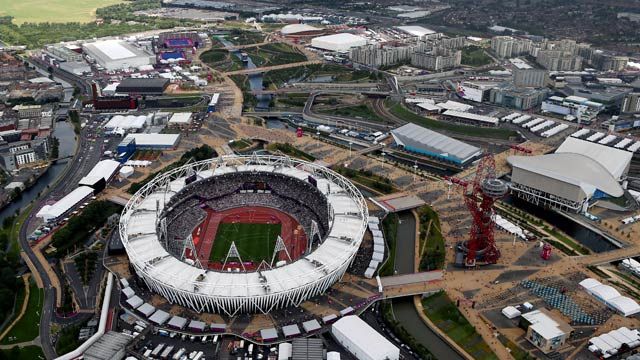This week’s guest Moyers & Company guest — filmmaker Anthony Baxter — criticizes Donald Trump’s aggressive efforts to build “the greatest golf course in the world” across ancient sand dunes in Scotland. Baxter says the local Scottish community pays a heavy price for such greedy expansion in terms of both their homes and the environment. Now imagine that “greatest golf course” on a much larger scale: The Olympics. A recent story in The Atlantic called the Olympics a “loser’s game” for the host country, so we asked Dave Zirin, who writes about the intersection of sports and politics for The Nation, to further explain the surprising downsides to “home field advantage.”

Theresa Riley: Historically, is it true that hosting the Olympic games is a risky bet? What are some of the downsides?
Dave Zirin: No matter what the democratic or autocratic traditions, no matter if it’s a Western democracy or a country like China, the results are very similar whenever the Olympics occupy a given city. You get a huge explosion of debt. You get the displacement of people from their homes, and you get the imposition of a police state.
What’s interesting is how much more accelerated this has become in the post-9/11 world with advances in technology and surveillance, and with the need to create what they call a green zone that can be made secure. It’s worth noting that this green zone is really not governed by the city or by the country in question. It’s governed by the International Olympic Committee, and it’s also, disturbingly, governed by the IOC’s primary corporate underwriters.

Olympic athletes queue up at the McDonald's inside the dining hall at the Olympic Village in London. (AP Photo/Bullit Marquez)
So in London, for example, within their green zone you have what are called the brand police, and they make sure that nobody is wearing or advertising any brands that aren’t official Olympic sponsors. McDonald’s has even gotten all the famous fish and chip restaurants to not sell chips, just fish, because they want to corner the french fry market. I mean it’s from the bizarre to the ridiculousto the offensive, but this is the reality.
So, yes, the Olympics bring in a lot of capital, a lot of money, but it does not trickle down. And it creates a set of conditions that are much more about the 1% than the benefit of the 99%.
Riley: I haven’t actually looked into ticket prices at the London Olympics. Are they pretty expensive?
Zirin: Yeah, they are expensive. There’s actually widespread discontent with the Olympics being there, and one of the reasons for that discontent was the lack of availability of tickets. So much tax money is going into putting these on, and yet, they really did not release tickets to the general public to be able to go. So every time there’s a crowd shot and you see empty seats, it really is like a thorn in the side to a lot of people in London who aren’t really being able to take part in the games.
Riley: I read one article that reported that members of the military were being recruited to fill empty seats.
Zirin: Yes, which is not difficult because there’s more military on the ground right now in London than the UK has had at any time in Afghanistan.
Riley: In your book, A People’s History of Sports in the United States, you talk about the history of sports complexes and stadiums in the United States over the past 40 years or so. One of the stories that stood out for me was about the New Orleans Superdome and Katrina and the fact that many of those seeking refuge there were seeing the inside of it for the first time, because they couldn’t afford tickets to events there. Is that a fairly common issue in American cities, that people living near stadiums can’t afford tickets?
Zirin: Yeah, that’s very typical. I mean it depends, because a lot of major league cities in the last couple years have started doing things like dollar ticket night, or even recession night, because it looks bad for your product in terms of television if you have nobody in the stands actually watching. So at least in baseball there’s been more of an effort to release inexpensive tickets to get more people in there.
But I would make the case that working class people have been so alienated from the idea of going to sporting events because it’s been so expensive for so long, it doesn’t necessarily connect. For example, I was in Los Angeles speaking at a high school and I asked a group of 50 students how many of them had ever been to Dodger Stadium — and only one raised their hand. It is very different than it was even a generation ago. It’s become a race for public subsidies, for cable contracts, and for luxury boxes, as opposed to trying to be the sort of industry that says how can we get as many fans to go through the turnstiles as possible in a given year.
Riley: The Superdome was built in 1975. Is that the earliest example of a public/private partnership?
Zirin: The earliest example was when the Dodgers took over Chavez Ravine in the 1950s. But the thing about the Superdome that’s particularly interesting is that it was built as part of what urban development would look like in New Orleans. Because of the history of Mardi Gras, because it’s been a destination site for so many decades — this idea of saying, okay, we’re going to be a service economy, we’re going to try to draw in service dollars and create service jobs—and with that, of course, that also means low wage/no benefits jobs—and we’re going to build the city around this policy. It’s going to mean convention centers, it’s going to mean stadiums, it’s going to be trying to bring in business that can create a service economy.
This has become not just the rule of the United States, you see this internationally. The IMF and World Bank dictates to the developing world to create resort communities, [and] bring in tourism as opposed to developing industry that can compete on the world markets. Instead of industries competing with each other, people are competing for first world tourist dollars. And you see that approach being mimicked and copied in cities across the United States: Take Cleveland, for example, which has two new stadiums, as well as the Rock & Roll Hall of Fame. It’s a former rust belt city that has lost its industry and lost its innovation class, all at the same time. I could also point to Milwaukee, or Oakland. Pittsburgh is another. Look at the places with the publicly funded gleaming stadiums, and you’re seeing an urban economic orthodoxy which really is not for the benefit of the majority of people who have to live and raise families in these cities.
Riley: What’s been happening in the past few years? Cities across the country are suffering huge budget shortfalls. Has that affected the growth of new arenas?
Zirin: Well, I certainly think when there’s less fat on the system they become more creative about doing it. We’re looking right now at new stadium deals in a number of cities around the United States, and they tend to be a little bit more clever, either in terms of public-private partnership, or in the case of the Miami Marlins, a little more — or the Brooklyn [Barclays Center], a lot more — bald faced in the lies they tell in terms of what it can bring.
Riley: In terms of that — in Brooklyn (where I live), the developers sent out brochures with pictures of diverse happy people alongside a list of all the benefits the stadium would bring to the community. There was supposed to be a public park designed by Frank Gehry, there was supposed to be low-cost housing and none of that has materialized. Has that been true in other cities?
Zirin: I think people would search in vain for evidence of a case where a new stadium comes in and people aren’t pushed out. Even in the most highly touted examples, these are money losers, and for really simple reasons. I mean how long’s the basketball season, and then what happens to the neighborhoods when the basketball season is not in session? And so even at its best, you’re not creating something that in a year-round way creates an economic hub.
Riley: Are there any groups working to improve the situation?
Zirin: I’m on the board of the Sports Fan Coalition which is an organization that aims to organize sports fans for the purposes of advocacy, whether that advocacy is on Capitol Hill with regards to the antitrust protections that are used to shield sports from legal challenges and some of their practices, or whether it’s just organizing sports fans on a local basis, basically trying to build local chapters. I’m not paid anything for being on it or advocating it, but I do think that there’s value in making sure that sports fans are not passive participants in the process of sports, because you’ve seen how political sports can be and it’s important that we’re heard.
There’s been some good successes, like particularly recently, the blackout rules in the National Football League were challenged. Even though all citizens are paying for football stadiums (whether you’re a football fan or not), the NFL has this rule that if the stadium isn’t sold out they’re not going to show the game on local TV — which is just outrageous. Those blackout rules were relaxed this offseason and the Sports Fans Coalition through its advocacy played an important role in that. Neil De Mause also runs a blog, Field of Schemes, that has a lot of great information.
Dave Zirin is the author of several books, including A People’s History of Sports in the United States and Bad Sports: How Owners are Ruining the Games We Love. You can find all his work at edgeofsports.com.


